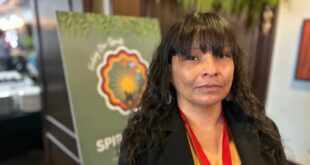People diagnosed with ALS are usually given two to five years to live

Albertans living with ALS, commonly referred to as Lou Gehrig's Disease, have a new treatment option that can improve their quality of life and help them live longer — one the Alberta government will cover for the estimated $18,500 a month per patient.
On Aug. 1, the province added the trademark drug, Albrioza, to the Alberta Drug Benefit List, which allows eligible patients to be reimbursed for the cost of the treatment.
Alberta joins Ontario, Quebec, British Columbia and New Brunswick to provide public coverage for the drug.
It's more than a year after Health Canada conditionally approved the drug in June 2022.
Leslie Ring-Adams, executive director of the ALS Society of Alberta, said the timeline has been too long for people with the disease, for which there is no known cure.
"Our families don't have the luxury of time," Ring-Adams said in an interview. "Things need to be quicker on the regulatory process."
People with ALS — amyotrophic lateral sclerosis, a gradual wasting away of nerve cells in the brain and spinal cord — live about two to five years after the onset of symptoms.
The first signs of ALS include weakness in a leg, hand or the face, or having a hard time talking or swallowing, Alberta Health says on its website.
As motor neurons slowly die, ALS causes muscle twitching, trouble using hands and fingers, problems with speaking, swallowing, eating, walking, and breathing.
Clinical trials
Dr. Theodore Mobach, a neurologist and director of the ALS clinic in Calgary, said trials are showing that Albrioza helps slow the death of the motor neuron cells.
It's difficult to gauge how well the medication is working for an individual, he said, but they're getting a sense of the drug's efficacy based on the group of patients.
The American-based Amylyx Pharmaceuticals, which manufactures Albrioza, conducted a clinical trial in 2020.
"Based on that trial, the patients who got the medication Albriosa progressed at a slower rate than the patients who are on placebo," Mobach said.
"It's a modest, but statistically and likely clinically significant benefit."
Health Canada approved the drug after two phases of trials. Mobach noted the national health agency typically puts a drug through three phases.
Phase one is to prove it's safe, phase two to show that it's starting to work, and phase three to reiterate that it works and not by chance.
Mobach said because ALS doesn't have a cure and it impacts patients so dramatically, Health Canada approved the drug conditionally based on the phase two trial.
Two other main drugs are used to treat ALS: Riluzole and Edaravone.
A phase-three trial is underway, Mobach said. It is aimed at providing more information on the medication's level of benefit and consistency between trials and studies.
'It's working because here I am'
Ralph Scott, who lives in Calgary and was diagnosed with ALS in Nov. 2021, has been taking the drug for 14 months.
"It's working because here I am," the 65-year-old said last week.
The former trucking professional was able to get the drug from the company at no cost after attending an ALS seminar last year in Calgary.
Mobach said Amylyx has been providing the drug to some patients through a compassionate supply while it negotiated with the pan-Canadian Pharmaceutical Alliance (pCPA) to get the drug covered through federal, provincial, and territorial public drug plans.
Scott takes the powder twice a day, in addition to Edaravone.
"I'm a perfect example of somebody living with ALS as opposed to sitting in a dark room waiting for my demise," Scott said. "We need the opportunity to survive, to live with ALS."
He's thankful the high cost of the drug is now covered, knowing his wife will now be OK when he dies.
Scott is one of between 50 to 100 people in Alberta on the medication, Mobach estimates, of the 400 to 500 Albertans living with ALS.
Patients are eligible for coverage through Alberta Blue Cross if they've had ALS symptoms for 18 months or less and don't need to be on ventilation, according to the province's drug benefit list.
Coverage is granted through special authorization for six months and must be prescribed by a neurologist.
ABOUT THE AUTHOR
Journalist
Natasha Riebe landed at CBC News in Edmonton after radio, TV and print journalism gigs in Halifax, Seoul, Yellowknife and on Vancouver Island. Please send tips in confidence to natasha.riebe@cbc.ca.
*****
Credit belongs to : www.cbc.ca
 MaharlikaNews | Canada Leading Online Filipino Newspaper Portal The No. 1 most engaged information website for Filipino – Canadian in Canada. MaharlikaNews.com received almost a quarter a million visitors in 2020.
MaharlikaNews | Canada Leading Online Filipino Newspaper Portal The No. 1 most engaged information website for Filipino – Canadian in Canada. MaharlikaNews.com received almost a quarter a million visitors in 2020.







